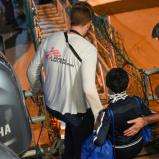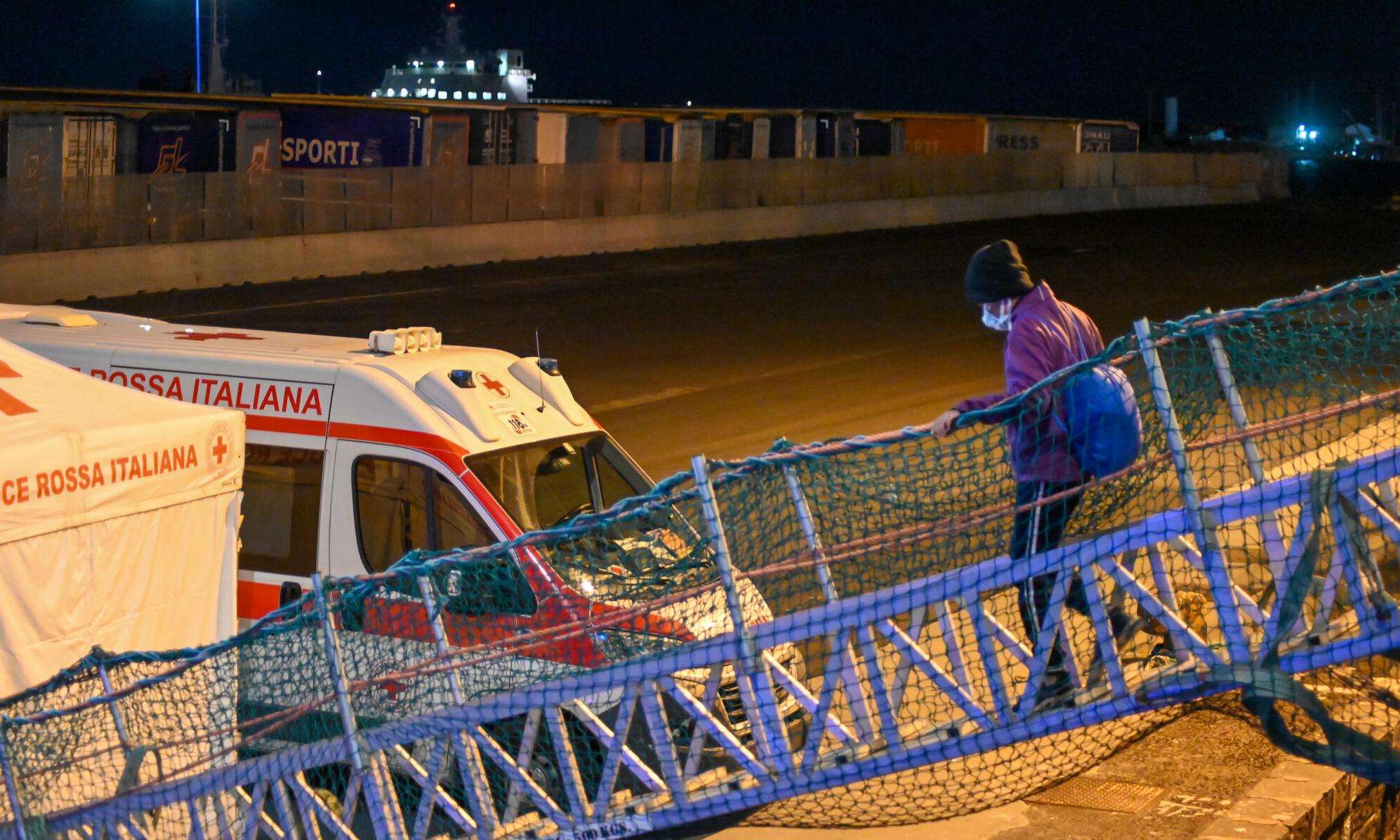In early November, hundreds of survivors rescued at sea were blocked by Italian authorities from disembarking to a place of safety, in violation of international maritime law. Of the 572 people on board the Geo Barents, a search and rescue ship operated by Doctors Without Borders/Médecins Sans Frontières (MSF), 357 individuals were allowed to disembark in Catania on November 6. That left 215 people still stranded on the boat, despite their acute need for medical and psychosocial assistance. Many of these survivors were already traumatized after suffering violence and abuse in their home countries and along the treacherous migration route through Libya.

Survivors on board Geo Barents ship safely disembark in Italy after harmful delays
Read moreFollowing calls for urgent action by MSF and other international organizations, Italian authorities finally permitted all remaining passengers to disembark on November 8. The group had spent 10 days at sea and three days waiting at port.
Here, three of the survivors share their stories:
Testimonies from the Geo Barents, Rotation 19, November 2022
Youssouf*
Youssouf was one of 215 survivors who were not allowed to leave the Geo Barents during the initial selective disembarkation in Catania on November 6. After waiting for hours to disembark, Youssouf, along with two others, jumped off the boat and swam to shore. He stayed on the dock, refusing to eat or drink, awaiting a decision from Italian authorities. He was officially permitted to enter Italy on November 8, along with the other remaining passengers from the Geo Barents.
“After days and days on that boat [Geo Barents] I was going insane. I had the feeling that my body and my dreams were breaking apart. I'm grateful for all the assistance I had onboard, but I couldn’t stand that situation anymore.
I left northern Syria to provide a safe life to my family. I have four daughters who I have left behind, hoping they can join me in Europe, in a safe place, soon. The youngest one is only six years old. They have witnessed bombs falling on our city in recent years, and now they can’t attend school due to the insecurity that persists in the area. Armed groups are everywhere, kidnapping people for ransom. The situation has spiraled out of control, and I fear for their lives every day.
I simply want to find a place where they can be free of fear and feel safe. That is my dream, and I will not let anyone take it away from me."
Akhtar*
Akhtar, age 21, left Bangladesh nearly two years ago, traveling first to Syria, then to Libya, and ultimately across the Mediterranean Sea. Akhtar was on a crowded wooden boat when he was rescued in late October by the Geo Barents. He was also among the group of passengers initially blocked from disembarking in Catania.
“We are a farming family. Life has always been difficult, but after my father was hurt a few years ago, things got even worse, because he was unable to work. I am aware of what anger feels like. I left Bangladesh to help [my family], to look after them. I want my younger brother and sister to go to school.
I had no idea how difficult this journey would be. I stayed in Libya for over a year, living in a camp with people from various countries. We were nine people sleeping in a ten-square-meter room, with only one toilet for over 200 or 300 people.
The police arrived at the camp, arrested many of us, and took me to prison. They gave me a phone after a few days and told me to call my family. I'll never forget my mother screaming on the phone as the guards threatened to cut my hand with a machete [unless we paid a ransom]. My family eventually sent the only money they had to free me.
I will never forgive myself for causing all of this pain to my mother. I haven’t heard from my family since. They do not know if I drowned in the sea. I just want to call them and tell them I survived.”
Dawood*
Dawood is a 33-year-old man from Darfur, Sudan, where a vicious civil war erupted in 2003 and ongoing tensions still cause mass displacement. He was among the group kept waiting on board the Geo Barents following the selective disembarkation process.
“I left my village in Darfur when the Janjaweed militia attacked us. With my family and many other people from my village, we fled into one of the IDP [Internally Displaced People] camps to seek safety. Because of the insecurity, I moved from one camp to another. Even within the camps, armed forces frequently came to raid and take away many young people.
I've been living in an IDP camp for nine years, surviving solely on the humanitarian aid provided by non-governmental organizations. In 2012, I decided to move to Egypt. I left my family in the camp, and I haven’t seen my parents or my siblings since. I spent nine years in Egypt trying to rebuild my life. It was impossible. I was alone, paperless and most of the time desperate.
I ultimately made the decision to travel to Libya. In 2021, I entered that country from Egypt and arrived in Tripoli. I spent two years in Libya. I made three attempts to cross the Mediterranean Sea. The first and the second time that I tried the crossing, Libyan armed men intercepted us and brought back to Libya. The first time I was taken to the detention center–I don’t even know how many days I spent in that place. All I can think of is that they beat us all the time, gave us food just once a day, and made us drink water from the toilets. One man was left to bleed on the ground all night while another had his leg fractured. I had no money to pay the ransom, my family is very poor. When some of the guards arrived to force me to work for them outside the prison, I took advantage of the situation to flee. The second time I was intercepted at sea, I escaped from the guards as soon as we arrived at the dock in Libya. It was my only hope of survival.
I was rescued by the Geo Barents in October, when I attempted to cross the sea for the third time. I'm just grateful to be alive. All I wish now is to feel safe. I don’t remember this feeling anymore.”
*Names have been changed.




